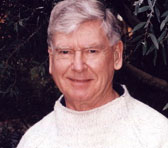24 January 2013
Don Kay at 80 - a personal perspective
 Image: Don Kay in 2007
Image: Don Kay in 2007 © Simon Barber
A fellow Tasmanian, Michael Kieran Harvey writes about composer Don Kay, whose 80th birthday will be celebrated on 25 January.
Read also: 'Collaborating with Don Kay' by John Honey (Resonate 24 January 2013).
The hottest day on record has just passed in Hobart and already the right-wing nuts in Tasmania are blaming the Greens for the catastrophic fires. As I goggle uncomprehending at reports of their redneck sons drag-racing and doing burnouts in the destruction and shell-shock of the Tasman Peninsula, my thoughts turn for relief to the exquisitely sensitive, pellucid music of Don Kay.
The last work of his I performed was Black Mary, a short piano work based on the romantic motif from his latest opera, written in his 80th year, The Bushranger's Lover. The parallels to Elliott Carter, still virile in music until almost 104 years of age, are apt, and in stark contrast to the mindless destruction so prevalent amongst we males of the species. Why, I wonder?
I look at someone like Mick Jagger, who faced up to male aggression and destruction at Altamont in the form of the Hell's Angels, who defined and revelled in the excesses of the rockstar, and yet who survived by choosing creative work over self-destruction. The Rolling Stones drummer Charlie Watts, who declared he became ill if he wasn't working (this from a drummer who has never in his life ventured outside 4/4 time!). Indeed, like Don Kay, it seems these people just keep on producing and contributing.
Recently John Cale came to visit Hobart and I was astonished when Don Kay told me he knew him and used to knock around with him in London in the 1960s. They in fact were teaching music at the same boy's school in London, and Don was a mentor to the grateful rookie. Don also knew and worked with Malcolm Williamson and Elizabeth Lutyens, two of the most uncompromising figures of new music in the world at the time.
It is notoriously difficult to describe music - one reason it still engages me - but I think it is this eclectic direct musical experience of London in the mid '60s that forged Don's compositional style. If we look at the piano works for instance, the lack of pretension, the directness of the melodic language, the clarity and precision of the harmony and counterpoint are hallmarks for me of Don Kay's musical idiom.
The pleasure for the eyes of his meticulous handwritten manuscript also gives a psychological insight into the accuracy of his intentions in performance. Moments of passion, though rare in his piano sonatas, are devastatingly prepared with the assured ear of a master well aware of the importance of context and silence, of less being much more powerful as a default, than more.
Don's wit and humour are evident throughout, whether it be in the subtle incorporation of 'impressionist' devices, tongue-in-cheek, or the deliberate complication of a left-hand figure to infuriate the unconscious, complacent pianist; to bring the performer briefly into the composer's struggle, as if to ask, 'why should piano music always be "pianistic"?' The seeming ease of his language belies a grim engagement with the extremes of the musical world wars post-1945. It is a hard won, and beautiful idiom unique to Don Kay.
Unlike many musicians and especially composers, Don is not a self-promoting, immodest hustler for the limelight. He exudes a quiet confidence in his own knowledge and yet also a compassionate desire to put others at their ease. He allows his music to speak for him, and avoids unnecessary publicity. In all my time here in Tasmania, I have not heard a word said against him. He is obviously a well-loved fixture of the Hobart music scene, valiantly attending concerts of all descriptions and quality, generously supporting and helping students, and always encouraging we musicians to keep going, Sisyphus-like.
His opera, embarked upon so late in life, concerns the dispossessed, people 'without cargo' as Jared Diamond has put it - the Aborigines, bushrangers, people with nothing, suffering at the hands of those lucky enough to be born in the right place at the right time. The wonderful writer and producer John Honey is his trusty and brilliant librettist, a man who shares Don's passion for live music and for showcasing music and ideas relevant to Tasmania's position in history.
A humility and counting of his blessings pervades all of Don's output, his music a celebration of how lucky we are and what responsibility is owed to the original owners of the land, and to the environment. I look outside - it's cooler now, but I'm still recovering from the shock of the last two weeks - I didn't expect things to get so hot this quickly, not here in Tassie.
AMC resources
Don
Kay - AMC profile (biography, work list and other
resources)
CDs of Don Kay's music available through the AMC Shop
'Collaborating with Don Kay' - an article on
Resonate by John Honey (24 January 2013)
Further links
Don Kay - Wikipedia
'Australianness'
in Australian music - a personal view by Don Kay (article
dated 11 November 1998)
© Australian Music Centre (2013) — Permission must be obtained from the AMC if you wish to reproduce this article either online or in print.
Comments
Be the first to share add your thoughts and opinions in response to this article.
You must login to post a comment.